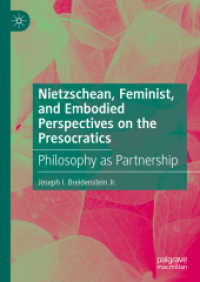基本説明
Ideal for undergraduates, the structure and content of this textbook reflects the way the philosophy of the social sciences is studied and taught.
Full Description
This is the definitive companion to the study of the philosophy of the social sciences. It provides the student with an accessible, comprehensive and philosophically rigorous introduction to all the major philosophical concepts, issues and debates raised by the social sciences. Ideal for use in undergraduate courses, the structure and content of this textbook - the most thorough, clearly argued and up-to-date available - closely reflect the way the philosophy of the social sciences is studied and taught. The text examines key conceptual and methodological questions in the social sciences and illustrates how these shape the practice of research, the interpretation of findings and theory formulation in such disciplines as economics, political science and psychology. The book not only offers lucid and incisive coverage of the philosophy of the social sciences, but also extends the major debates and considers the latest directions in this growing area of philosophical interest. Robert C.
Bishop's cogent and rigorous analysis is supplemented by useful pedagogical features, including key examples from philosophical writing; summaries of core debates; sample questions and exercises; and guides for further reading.
Contents
PART I: Introduction; 1. Conceptions of Science; 2. Historical and Philosophical Roots of the Social Sciences: Hobbes, Durkheim, Weber; 3. Five Modes of Social Inquiry; PART II: Ideals, Values and Social Science Practices; 4. Cultural Ideals I: Instrumental Reason; 5. Cultural Ideals II: Political Liberalism and Liberal Individualism; 6. The Myth of Value Neutrality: Disguised Ideologies in Social Science; 7. Methodological Holism and Methodological Individualism; 8. Garbage in-Garbage out: Passing Values Off as Scientific Research; PART III: Disciplinary Issues; 9. Psychology and the Behavioral Sciences; 10. Rational and Social Choice Theory; 11. Political Science; 12. Economics; 13. Sociology; PART IV: Problems, Debates, Controversies; 14. Handling Data; 15. Determinism and Freedom; 16. Explanation in the Social Sciences; 17. Natural Sciences and Social Science; 18. Beyond Objectivism and Relativism Bibliography.







